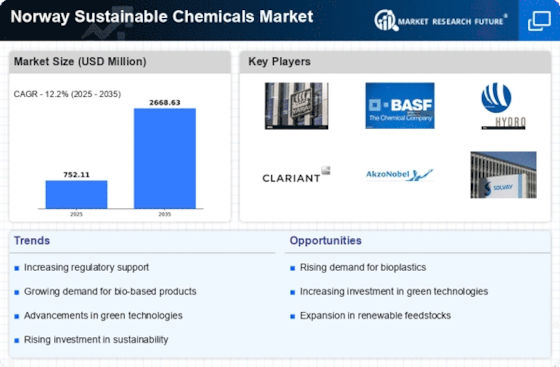Market Share
Norway Sustainable Chemicals Market Share Analysis
Norway’s sustainable chemicals market is strategically positioning itself to take advantage of the growing demand for environmentally friendly and sustainable solutions. This necessitates that companies strategically position themselves in order to have a competitive edge, as well as grow their influence within the industry. The approach most frequently used in this respect is product innovation and differentiation where they come up with cutting-edge sustainable chemical products that meet consumer needs demanding environmentally friendly choices over other alternatives thus distinguishing them from competitors. Consequently, this increases their market share while placing them at the forefront of sustainable chemicals sector.
Furthermore, amongst Norway's sustainable chemicals industry strategic alliances and collaborations greatly affect market share positions. They collaborate with research institutions, environmental organizations and more groups that support each other using collective expertise and resources. Partnerships like these promote innovations and also give credibility to the businesses involved.When companies’ partner together they are better placed to deal with complex sustainability concerns leading to integrated solutions that consequently enhances their standing on it.
Apart from cooperative initiatives, involvement of customers through education is another method employed by firms in Norway Sustainable Chemicals Market.This calls for direct lines of communication between a company and its clients so as to understand all details about them.Direct interaction between firms and consumers enables a company to understand particular requirements of its consumers.On the other hand,effective communication helps end-users learn about environmental benefits arising from use of sustainable chemicals.Unlike this idea,talking about benefits associated with green chemistry products when marketing to final users will make people conscious about conservationalism.Thus,a rising number of loyal customers can be achieved by those enterprises that implement excellent communication strategies which would also result into an increase in market segment.
Moreover, market penetration is another key determinant of positioning strategies for the marketers in Norway Sustainable Chemicals Market. Product distribution network should be able cover wide areas through marketing campaigns. Being present to more people ensures greater numbers of clients buying from a given firm. Businesses must therefore adapt different measures that would see their profitability increase through capturing a larger market share of the sustainable chemical solutions. This shows that such consumer behavior is rising.
Also, among strategies used by firms in the sustainable chemicals industry, compliance and certification is crucial for market share positioning. Certificates from recognized environmental organizations that are dedicated to ecological concerns can be obtained to support company’s commitment to sustainability. Thus, abiding by strict regulations improves their standing and also acts as entry barriers for competitors who might find it hard to comply with such conditions. As a result, firms’ proactivity in adhering to legislation puts them at the top of Norway Sustainable Chemicals Market.









Leave a Comment